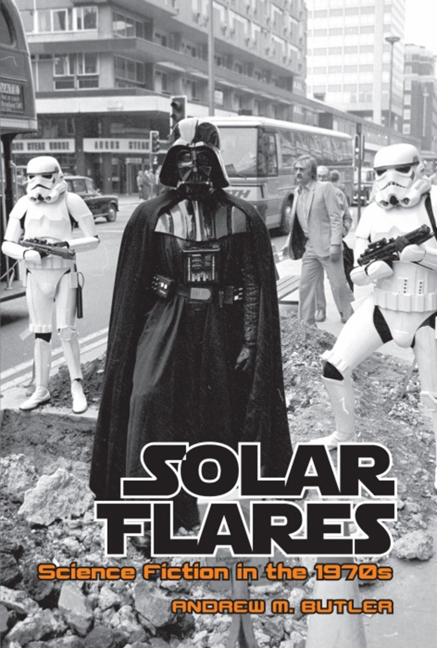Book contents
- Frontmatter
- Dedication
- Contents
- Acknowledgements
- Prologue
- 1 The Ends of First Sf: Pioneers as Veterans
- 2 After the New Wave: After Science Fiction?
- 3 Beyond Apollo: Space Fictions after the Moon Landing
- 4 Big Dumb Objects: Science Fiction as Self-Parody
- 5 The Rise of Fantasy: Swords and Planets
- 6 Home of the Extraterrestrial Brothers: Race and African American Science Fiction
- 7 Alien Invaders: Vietnam and the Counterculture
- 8 This Septic Isle: Post-Imperial Melancholy
- 9 Foul Contagion Spread: Ecology and Environmentalism
- 10 Female Counter-Literature: Feminism
- 11 Strange Bedfellows: Gay Liberation
- 12 Saving the Family? Children's Fiction
- 13 Eating the Audience: Blockbusters
- 14 Chariots of the Gods: Pseudoscience and Parental Fears
- 15 Towers of Babel: The Architecture of Sf
- 16 Ruptures: Metafiction and Postmodernism
- Epilogue
- Bibliography
- Index
1 - The Ends of First Sf: Pioneers as Veterans
- Frontmatter
- Dedication
- Contents
- Acknowledgements
- Prologue
- 1 The Ends of First Sf: Pioneers as Veterans
- 2 After the New Wave: After Science Fiction?
- 3 Beyond Apollo: Space Fictions after the Moon Landing
- 4 Big Dumb Objects: Science Fiction as Self-Parody
- 5 The Rise of Fantasy: Swords and Planets
- 6 Home of the Extraterrestrial Brothers: Race and African American Science Fiction
- 7 Alien Invaders: Vietnam and the Counterculture
- 8 This Septic Isle: Post-Imperial Melancholy
- 9 Foul Contagion Spread: Ecology and Environmentalism
- 10 Female Counter-Literature: Feminism
- 11 Strange Bedfellows: Gay Liberation
- 12 Saving the Family? Children's Fiction
- 13 Eating the Audience: Blockbusters
- 14 Chariots of the Gods: Pseudoscience and Parental Fears
- 15 Towers of Babel: The Architecture of Sf
- 16 Ruptures: Metafiction and Postmodernism
- Epilogue
- Bibliography
- Index
Summary
The stories of the early sf genre melded adventure with scientific marvels. Characters and themes were usually subservient to ideas. John Clute argues that ‘[the] result was an SF universe written in the shape of Man. Women and other aliens had visiting rights only’ (1995: 130), and – to overgeneralise – this sf believed in the possibility of progress, whereby each new invention would work to liberate mankind (sic), and, even if engineering problems might occur, further technology would resolve them. The isolated genius could change the world and an individual hero could bring down a tyranny. This was the genre formulated by Hugo Gernsback in Amazing Stories, further refined by John W. Campbell at Astounding. The Gernsback-Campbell continuum was challenged within the genre by the editors of magazines such as Galaxy, The Magazine of Fantasy and Science Fiction and If, and writers such as Alfred Bester, Theodore Sturgeon, Philip K. Dick and Robert Sheckley, who had more literary sensibilities and often a radical agenda. Clute suggests that what he refers to as First or Agenda science fiction was further challenged by the launch of Sputnik in 1956, as Soviet technology trumped American. The New Waves of the 1960s then pushed the boundaries of the genre beyond recognition. After the death of Campbell on 11 July 1971 and as genre sf approached its fiftieth birthday in 1976 – which would coincide with the US bicentennial – some of the First sf generation writers were given large, much publicised advances. But some of them retrod old ground, albeit at novel length. This chapter will consider the works of Isaac Asimov, Robert A. Heinlein, Arthur C. Clarke, Clifford D. Simak, Ray Bradbury, Alfred Bester and Leigh Brackett, who had all started publishing by 1941.
Asimov remained known for his 1940s and 1950s work, the Foundation and the robot stories, and had not written an sf novel since Fantastic Voyage (1966), a novelisation of the Richard Fleischer film. The Hugo and Nebula Awards given to The Gods Themselves (1972) acknowledge his return; it would be his only adult sf novel of the 1970s.
- Type
- Chapter
- Information
- Solar FlaresScience Fiction in the 1970s, pp. 11 - 23Publisher: Liverpool University PressPrint publication year: 2012



